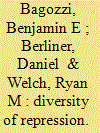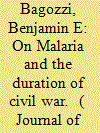|
|
|
Sort Order |
|
|
|
Items / Page
|
|
|
|
|
|
|
| Srl | Item |
| 1 |
ID:
182676


|
|
|
|
|
| Summary/Abstract |
Tactical repertoires of mobilization and repression play an essential role in understanding dynamics of political violence, yet existing quantitative approaches focus primarily on intensities or counts of repressive actions. We focus instead on the diversity of repression, and demonstrate a novel method of measuring repertoires of state repression using event data. We show that more repressive states are likely to employ more diverse repertoires of repression, rather than specializing narrowly in particularly coercive tactics. We demonstrate that, globally, repertoires of state repression are growing less diverse over time. Finally, in the Online appendix, we model repertoires of repression across countries and over time, finding evidence of broader repertoires during protest and civil war, but narrower under democratic regimes and international human rights treaties.
|
|
|
|
|
|
|
|
|
|
|
|
|
|
|
|
| 2 |
ID:
178647


|
|
|
|
|
| Summary/Abstract |
Research often fails to account for the specific pathways by which climatic factors can cause social unrest. One challenge lies in understanding the distinct effects of food insecurity and water insecurity – which we term ‘staple insecurities’ – while accounting for their interrelated nature, especially at high-resolution spatio-temporal scales. To unpack these dynamics, we leverage geolocated Twitter data across urban areas in Kenya and deploy a supervised machine learning approach to separately identify geolocated tweets concerning food and water insecurity, in both English and Swahili. The data are then aggregated to create daily measures of food and water insecurity for standardized grid-cells to examine how perceived food insecurity moderates and/or reinforces perceived water insecurity’s impacts on social unrest, and vice versa. Our findings suggest that food and water insecurities’ respective effects should be interpreted as mutually reinforcing – in compelling citizens to take to the streets – rather than as independent. Those concerned with climate change’s impact on conflict should hence endeavor to jointly account for both forms of insecurity, and their interactive effects.
|
|
|
|
|
|
|
|
|
|
|
|
|
|
|
|
| 3 |
ID:
144443


|
|
|
|
|
| Summary/Abstract |
Advances in the study of civil war have led to the proliferation of event count data, and to a corresponding increase in the use of (zero-inflated) count models for the quantitative analysis of civil conflict events. Our ability to effectively use these techniques is met with two current limitations. First, researchers do not yet have a definitive answer as to whether zero-inflated count models are a verifiably better approach to civil conflict modeling than are ‘less assuming’ approaches such as negative binomial count models. Second, the accurate analysis of conflict-event counts with count models – zero-inflated or otherwise – is severely limited by the absence of an effective framework for the evaluation of predictive accuracy, which is an empirical approach that is of increasing importance to conflict modelers. This article rectifies both of these deficiencies. Specifically, this study presents count forecasting techniques for the evaluation and comparison of count models' predictive accuracies. Using these techniques alongside out-of-sample forecasts, it then definitively verifies – for the first time – that zero-inflated count models are superior to comparable non-inflated models for the study of intrastate conflict events.
|
|
|
|
|
|
|
|
|
|
|
|
|
|
|
|
| 4 |
ID:
147313


|
|
|
|
|
| Summary/Abstract |
Geographic factors such as rugged terrain and distance from capital cities are widely believed to prolong civil wars by enabling rebel groups to resist total defeat. This article argues that prevalence of malaria can similarly serve to asymmetrically enhance rebels’ defensive capabilities and thus prolong civil war. Malaria prevalence does so in three complementary ways. First, while malaria can inflict costs on both government and rebel troops, these costs are magnified for larger and denser human groups; thereby ensuring that the costs of malaria will often be higher among government troop deployments. Second, because government soldiers are rotated in and out of conflict zones whereas insurgents typically are not, the former are likely to have a higher nonimmune exposure rate than the latter, which further ensures that government forces will be more susceptible to contracting and spreading malaria. Third, malaria can also indirectly prolong civil war by helping to maintain a socio-geographic environment that is conducive to insurgency. These three complementary factors advantage rebel forces’ abilities to resist defeat by government forces and prolong civil conflicts. I empirically test these arguments by examining the duration of civil wars and find strong support for a prolonging effect of malaria on civil conflict.
|
|
|
|
|
|
|
|
|
|
|
|
|
|
|
|
| 5 |
ID:
137707


|
|
|
|
|
| Summary/Abstract |
Trade volatility can do serious harm to a country's economic and political stability. Research suggests that international trade agreements can reduce such volatility by reinforcing extant trade commitments, improving transparency, promoting policy convergence, and strengthening investor confidence. Drawing on this logic, we posit that international political ties can also produce notable reductions in export volatility. Specifically, we argue that diplomatic missions and military alliances signal lower discount rates, increase political transparency, and enhance issue linkages among trading partners. These enhancements in turn work to stabilize trade flows. To test this argument, we use a gravity model to evaluate the effects of directed diplomatic relations and alliances on bilateral export volatility. Controlling for confounding variables and exploring a wide array of model specifications, we find that the establishment of diplomatic relations or alliances can significantly reduce trade volatility.
|
|
|
|
|
|
|
|
|
|
|
|
|
|
|
|
|
|
|
|
|